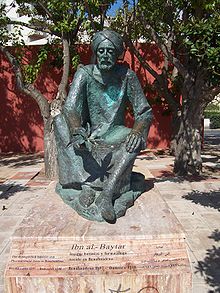Abu Muhammad ibn al-Baitar
Abu Muhammad ibn al-Baitar , also Diya 'ad-Din Abu Muhammad Abdallah ibn Ahmad ibn al-Baitar al-Malaqi ( Arabic ضياء الدين أبو محمد عبدالله بن أحمد بن البيطار المالقي, DMG Ḍiyāʾ ad-Dīn Abū Muḥammad ʿAbd Allāh b. Aḥmad b. al-Baiṭār al-Mālaqī ; * around 1190 in Benalmádena , Province of Málaga ; † 1248 in Damascus ), was an Andalusian doctor , botanist and pharmacologist .
Ibn al-Baitar studied in Seville with Abu al-Abbas al-Nabati, among others, and collected plants during this time. He emigrated to the Orient through North Africa around 1220 and lived in Asia Minor and Syria in 1224 . He later settled in Cairo and was appointed " Chief Botanist" of Egypt by Sultan Al-Kāmil . In this position he was the superintendent of pharmacies and drug stores. During this time he also went on research trips with his students.
His main merit is the systematization of the medical-pharmacological knowledge of the Arabs of the Middle Ages. He wrote several works. The best known is the "Kitab al-Ǧāmiʿ mufradāt al-adwiya wa-'l-aġḏiya ??".
In it he not only names the names of medicinal plants, but also reports on the drugs obtained from them. It describes more than 1,400 remedies made from plants and formulas for how to use them. His knowledge found its way through the monasteries and translation schools of the Middle Ages. Ibn al-Baitar was thus the supreme authority in herbal medicine in Europe throughout the Middle Ages . One of his students was the Syrian doctor and pharmaceutical author ʿIzz ad-Dīn as-Suwaidī (* 1204 in Damascus).
Works (selection)
- Tafsῑr Kitāb Diyūsqūrῑdūs. Commentary on the Materia medica of Dioscurides . In it the plants of Dioscurides are commented lemma by lemma. The fifth book, on wine and mineral drugs, was omitted.
- Kitāb al-Mugnῑ fῑl-adwiya al-mufrada. A book on simple remedies in 20 chapters.
- Kitab al-Ǧāmiʿ mufradāt al-adwiya wa-'l-aġḏiya. The most famous work of Arab pharmacognosy and dietetics. It represents a huge collection of excerpts in which more than 260 sources were written out.
- Translations of the Kitab al-Ǧāmiʿ mufradāt al-adwiya wa-'l-aġḏiya :
- Joseph von Sontheimer. Large compilation of the powers of the well-known simple healing foods and foods by Abu Mohammed Abdallah ben Ahmed from Malaga, known under the name Ebn Baitar. Translated from the Arabic by Joseph von Sontheimer. Hallberger, Stuttgart. Volume I 1840 digitized BSB Munich . Volume II 1842 digitized BSB Munich .
- Lucien Leclerc . Traité des simples par Ibn el-Baithar. 3 volumes, Paris 1877, 1881 and 1883.
source
- Jahn: History of Biology , Spectrum 2000
literature
- Albert Dietrich [Ed.]: The Dioscurides Declaration by Ibn al-Baitâr: a contribution to the Arabic plant synonymy of the Middle Ages . Arabic text with commented German translation, Göttingen 1991
- Heinrich Schipperges : Ibn al-Baitār. In: Lexikon des Mittelalters V, p. 313.
- Friedrun R. Hau: Ibn al-Baiṭār (Ḍiyāʿ ad-Dīn ʿAbdallāh). In: Werner E. Gerabek , Bernhard D. Haage, Gundolf Keil , Wolfgang Wegner (eds.): Enzyklopädie Medizingeschichte. De Gruyter, Berlin / New York 2005, ISBN 3-11-015714-4 , p. 133.
- Manfred Ullmann . Medicine in Islam. Brill, Leiden 1970, pp. 281-285 and 291.
Individual evidence
- ^ Friedrun R. Hau: as-Suwaidī, ʿIzz ad-Dīn. In: Werner E. Gerabek , Bernhard D. Haage, Gundolf Keil , Wolfgang Wegner (eds.): Enzyklopädie Medizingeschichte. De Gruyter, Berlin / New York 2005, ISBN 3-11-015714-4 , p. 1369.
- ^ Manfred Ullmann. Medicine in Islam. Leiden 1970, p. 283: "The German translation by Joseph von Sontheimer is very flawed, better the French translation by Lucien Leclerc."
Web links
- Literature by and about Abu Muhammad ibn al-Baitar in the catalog of the German National Library
| personal data | |
|---|---|
| SURNAME | Abu Muhammad ibn al-Baitar |
| BRIEF DESCRIPTION | Arab doctor, botanist and pharmacologist |
| DATE OF BIRTH | around 1190 |
| PLACE OF BIRTH | Benalmádena , Province of Malaga |
| DATE OF DEATH | 1248 |
| Place of death | Damascus |
